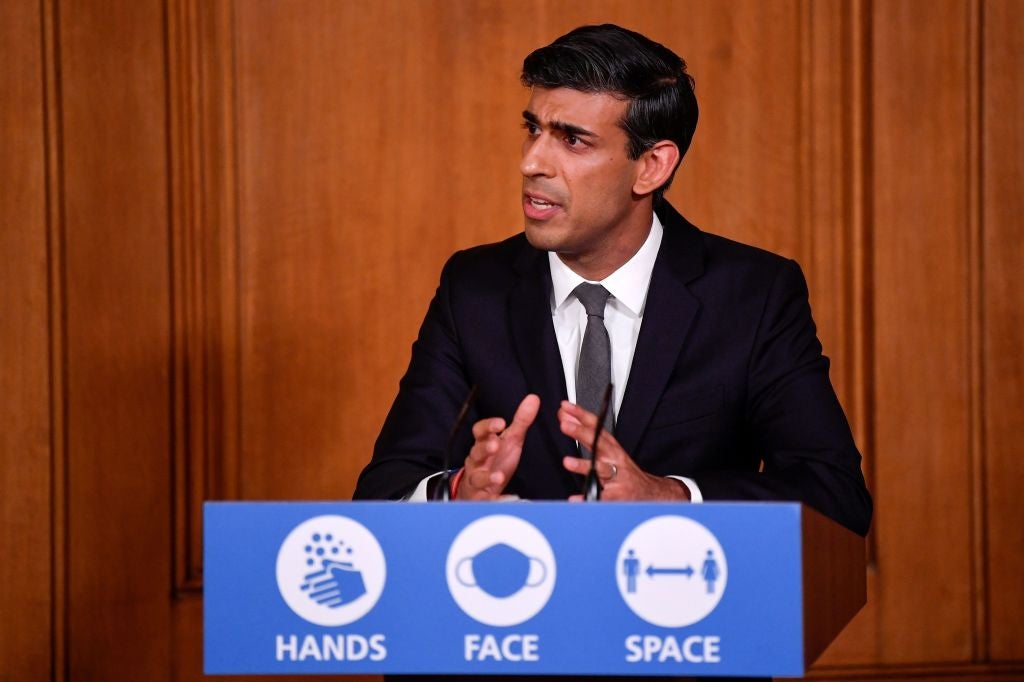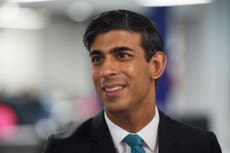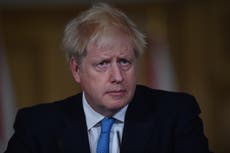Rishi Sunak’s untimely tightening of the purse strings suggests he is about to go from hero to zero
The chancellor’s rapid transition from spendthrift to Scrooge has not yet been noticed by the admiring public but a change has undoubtedly occurred


Your support helps us to tell the story
From reproductive rights to climate change to Big Tech, The Independent is on the ground when the story is developing. Whether it's investigating the financials of Elon Musk's pro-Trump PAC or producing our latest documentary, 'The A Word', which shines a light on the American women fighting for reproductive rights, we know how important it is to parse out the facts from the messaging.
At such a critical moment in US history, we need reporters on the ground. Your donation allows us to keep sending journalists to speak to both sides of the story.
The Independent is trusted by Americans across the entire political spectrum. And unlike many other quality news outlets, we choose not to lock Americans out of our reporting and analysis with paywalls. We believe quality journalism should be available to everyone, paid for by those who can afford it.
Your support makes all the difference.One of the hot stocks of 2020, British chancellor Rishi Sunak, is starting to look seriously overvalued. His political allies, having talked up Sunak earlier in the year, tipping him for the top job, are now hedging their bets. The hero of the spring offensive may be on the brink of becoming the zero of the autumn retreat.
The immediate reason is political; the deeper reason is economics. It is one thing to get the lion’s share of the credit when things are going well, overshadowing the boss with timely and generous economic handouts. It is much more dangerous to make the boss look weak and foolish through an untimely and ungenerous tightening of the purse strings.
In the spring, Boris Johnson got away with a fumbling and dilatory response to the pandemic but was rescued by his chancellor’s ambitious spending package, which sustained demand and compensated workers and businesses for the enforced lockdown. Conversely, now that the pandemic has resurged, the prime minister’s floundering and confusion are compounded by his chancellor’s reluctance to support him financially. Their collective failure to offset the hardship expected at the end of furlough, and in regions affected by new tough restrictions, will be very damaging.
A few weeks ago, Sunak extended, partially and reluctantly, the furlough scheme. Jobs supported by the new scheme will attract a subsidy of, at most, 22 per cent of previous pay and the companies trying to employ part-time staff will be penalised.
Clearly the full furlough job subsidy could not continue forever. But hopes that with economic recovery would eventually come new jobs are obscured by the miserable fact that even before the second Covid wave started to break, the UK was on track to see an additional one million on the dole, soon reaching 2 to 3 million – between 7 and 10 per cent of the labour force.
On top of that, we now have the three-tier response to the resurgence of infections. As a result of Andy Burnham’s very effective public lobbying, the Treasury has reluctantly agreed to more money, around £40m, for Greater Manchester to offset the economic damage caused by the new restrictions. But it remains to be seen whether the money is enough, whether it will cover the supply chains of the hospitality sector and whether it will be extended to areas with mayors and councils less assertive than Burnham. What is certainly true, and perverse, is that tier 2 areas like London, which will also see restrictions imposed, will get nothing.
Sunak’s rapid transition from spendthrift to Scrooge has not yet been noticed by the admiring public. Nor has it yet got to the more gullible Tories, who have persuaded themselves that this wunderkind is a fusion of Franklin Roosevelt and Margaret Thatcher, who will rescue them from the backlash against Bumbling Boris. But a change has undoubtedly occurred.
The guardians of public finance in the Treasury have realised with horror how much money is being lost or stolen. Not since the collapse of the Soviet Union has quite so much public dosh been squandered to the benefit of sharp-witted scam-artists. The National Audit Office believes that £15bn to £26bn could be lost from its business loan schemes alone, some due to commercial default but some also to a “very high” level of fraud. And that is just one of the programmes in the £300bn of public support this financial year (on top of the “normal” £850bn public spending).
The test and trace system – the abject failure of which is one of the main reasons why Britain is faced with the prospect of an unnecessary and debilitating national lockdown, or “circuit breaker” – is being financed by a £10bn budget. Much of that budget is disappearing into notoriously expensive and poor quality private providers like G4S and Serco, with consultants being paid thousands of pounds per day. Like paying people to dig holes in the road and fill them in again, there is some benefit from the Keynesian multiplier of spending; but you don’t have to be a hair-shirted austerity obsessive to worry about the misallocation of funds.
Much less sensibly, the Treasury’s traditional allergy to rising public debt – however justified – is reasserting itself. Britain, like almost every other country, is ratcheting up debt levels to keep the economy afloat. But we are far from the most lavish. Britain’s Covid fiscal measures amount to around 6 per cent of GDP, half of the stimulus deployed in the US or Japan – both of which started with higher debt to GDP levels – and two-thirds that of Germany (around 9 per cent of GDP).
Economic conditions are quite different from those that prevailed in the wake of the 2008 financial crisis. Carmen Reinhart, the economist whose warnings to reduce spending were quoted to the Coalition cabinet in 2010 and who is now chief economist at the World Bank, is pleading with governments – supported by the IMF – to borrow to spend. “First you worry about fighting the war, then you figure out how to pay for it,” she says.
It makes perfect sense to borrow when borrowing costs are below or close to zero (for the UK, 25-year government bonds pay 1.5 per cent interest, less than current or expected inflation). Even a sluggishly growing economy could comfortably pay the government’s interest without an increase in tax. Central banks, like the Bank of England, are signed up to doing what is necessary: buying up government paper to keep long-term interest rates low.
And there is suddenly a glut of savings. British households were spending almost all their income until this year; their savings now account for a quarter of our combined incomes, which depresses interest rates (and also depresses the economy unless the government offsets the loss of spending power). So forget about the debt, for now.
If Sunak is to remain on his pedestal, it will be through generous but targeted spending to prevent the economy sliding back into a slump. There are three priorities.
The first is jobs, jobs and more jobs – especially for young people. I suggest Rishi telephones Gordon Brown who has re-entered the fray with a call to arms and a list of sensible suggestions. And he should mobilise some good public investment projects, which the Treasury hates, but the economy needs and can be identified with help from activist mayors like Burnham and local councils in “left behind” areas.
The second is to ensure that there is an adequate safety net for those who are otherwise faced with severe hardship: a generous boost to universal credit combined with removal of those miserly, petty restrictions like the five-week wait.
The third is to continue his reported plotting with Michael Gove and other, saner, Brexiteers who are staging a rear-guard action to stop the head-bangers from forcing a no-deal Brexit.
Only time will tell whether such measures will save the British economy but, for the short term, they would at least shore up the market in Sunaks.
Sir Vince Cable is the former leader of the Liberal Democrats



Join our commenting forum
Join thought-provoking conversations, follow other Independent readers and see their replies
Comments